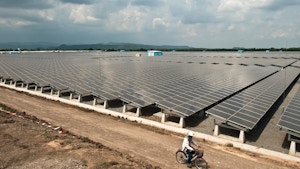Southeast Asia's Clean Energy Transition
All our latest stories. Back to Sea's Clean Energy Transition.

Exclusive
In this new podcast series 'Climate Tech in Asia', Eco-Business speaks to Gogoro chairman and CEO Horace Luke about the company's recent listing on the Nasdaq and its quest to electrify Asia's ubiquitous two-wheelers and make battery swapping mainstream.

An independent watchdog has asked the bank’s private sector arm to pay reparations for serious social and environmental impacts from at least 10 new coal-fired power plants it has bankrolled over the past decade.

A US$22 billion project involving 12,000 hectares of solar panels and 3,800km of cabling running from Darwin to Singapore might be the most ambitious renewable energy project ever. How will it work? Eco-Business talked to Fraser Thompson of project developer Sun Cable.

The climate talks in Glasgow could have a major trickle-down effect on Asia's business community. What should the region's businesses expect from COP26? The Eco-Business Podcast asked energy and sustainability expert Malavika Bambawale.

Brunei Darussalam's renewable energy policy is as modest as its hydrocarbon strategy is ambitious. The petrostate is banking on technology to reduce its carbon footprint to preserve its ambitious expansion of oil and gas activities.

SDG 13. Climate
When the wind drops and the sun goes down: how can Southeast Asia handle fluctuating clean power supply?
While solar and wind help countries meet energy security and environmental objectives, their variable nature poses challenges to electricity grids that require utilities to rethink operations.

Carbon capture is seen as essential if energy-hungry Southeast Asia is to reach climate goals. But critics maintain that the technology remains unproven and may never deliver the vast emissions reductions needed.

Indonesia's potential to generate energy from the earth's crust could solve its power problems and fire its ailing economy. But the country needs to do more to lure investors.

Some Southeast Asian nations have displayed leadership in facilitating bottom-up renewable energy development. Now it is time for others to follow suit.

As Southeast Asian nations embark on their energy transition journey, there is huge potential for digital technologies to improve energy efficiency, prepare grids for higher shares of renewables, and cut power costs.

With governments and companies racing towards net zero, Google has set a target to use clean energy for every location and every hour of its operations by 2030. Is this possible?

SDG 13. Climate
End fossil fuel extraction now: What IEA’s net-zero alert means for the climate fight
Eco-Business talks to Peter Kiernan, lead energy analyst for the Economist Intelligence Unit, to unpack a new landmark report from the International Energy Agency, which proposes an immediate ban on fossil fuels extraction to curb global warming.


Transforming Innovation for Sustainability Join the Ecosystem →

